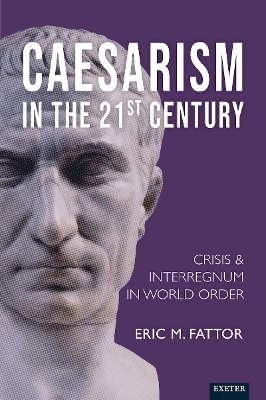
Caesarism in the 21st Century
Crisis and Interregnum in World Order
Seiten
2024
University of Exeter Press (Verlag)
978-1-80413-070-4 (ISBN)
University of Exeter Press (Verlag)
978-1-80413-070-4 (ISBN)
The profound turbulence in global politics is the result of digital information technologies changing the structure and makeup of world order. As these changes unfold, authoritarian leaders have taken advantage of the lack of legitimacy in global governance and exploited electronic media capabilities to become digital Caesars.
The troubles of the contemporary moment in history can be interpreted many different ways. Indeed, there has been no shortage of analysis and commentary on events like the attacks of September 11th, the Great Recession, the Arab Spring, the election of Donald Trump and the global pandemic. This book, however, argues that the most insightful analysis comes from the application of a neo-Gramscian framework that sees these events as “morbid symptoms” of an interregnum in world order between an older historic bloc of power losing its legitimacy and a still undefined new historic bloc in the process of being born.
Like previous interregnums, this period of transition is marked by eruptions of Caesarism where charismatic “men of destiny” boosted by populist fervor assume leading roles in the governing institutions of their states and make bids for global leadership or domination. Unlike previous eras, however, these “digital Caesars” have been most empowered by the proliferation of electronic information and media capabilities that have revolutionized human interaction since the end of the previous century.
At the head of superpower states and Silicon Valley technology companies, this new breed of Caesar is taking advantage of the loss of legitimacy in conventional institutions to remake the world according to their eclectic visions. Like previous Caesars, however, their power is fragile and will likely disappear assuming a new world order can take hold before they do permanent damage to human civilization.
The troubles of the contemporary moment in history can be interpreted many different ways. Indeed, there has been no shortage of analysis and commentary on events like the attacks of September 11th, the Great Recession, the Arab Spring, the election of Donald Trump and the global pandemic. This book, however, argues that the most insightful analysis comes from the application of a neo-Gramscian framework that sees these events as “morbid symptoms” of an interregnum in world order between an older historic bloc of power losing its legitimacy and a still undefined new historic bloc in the process of being born.
Like previous interregnums, this period of transition is marked by eruptions of Caesarism where charismatic “men of destiny” boosted by populist fervor assume leading roles in the governing institutions of their states and make bids for global leadership or domination. Unlike previous eras, however, these “digital Caesars” have been most empowered by the proliferation of electronic information and media capabilities that have revolutionized human interaction since the end of the previous century.
At the head of superpower states and Silicon Valley technology companies, this new breed of Caesar is taking advantage of the loss of legitimacy in conventional institutions to remake the world according to their eclectic visions. Like previous Caesars, however, their power is fragile and will likely disappear assuming a new world order can take hold before they do permanent damage to human civilization.
Eric Fattor is a member of the faculty at Colorado State University, teaching courses in international politics, security studies and political theory. His research and publications examine how media and information platforms constitute forms of power in global politics and play a key part in various forms of international conflict.
Introduction: From Monsters to Caesars
1. Caesarism and Crisis
2. From Interregnum to Caesarism
3. The Digital Revolution of Global Affairs
4. The Caesars of the Twenty-First-Century Interregnum
5. After the Fall of Caesar
Conclusion: The Paralysis of the Present
Notes
Bibliography
Index
| Erscheinungsdatum | 13.02.2024 |
|---|---|
| Reihe/Serie | Exeter Studies in World Orders |
| Verlagsort | Exeter |
| Sprache | englisch |
| Maße | 156 x 234 mm |
| Gewicht | 460 g |
| Themenwelt | Sozialwissenschaften ► Politik / Verwaltung ► Europäische / Internationale Politik |
| Sozialwissenschaften ► Politik / Verwaltung ► Politische Theorie | |
| ISBN-10 | 1-80413-070-2 / 1804130702 |
| ISBN-13 | 978-1-80413-070-4 / 9781804130704 |
| Zustand | Neuware |
| Haben Sie eine Frage zum Produkt? |
Mehr entdecken
aus dem Bereich
aus dem Bereich
Studienbuch
Buch | Hardcover (2023)
De Gruyter Oldenbourg (Verlag)
CHF 62,90
erfolgreiche Interessenvertretung durch Prozesskompetenz im komplexen …
Buch | Hardcover (2023)
Wiley-VCH (Verlag)
CHF 58,75


